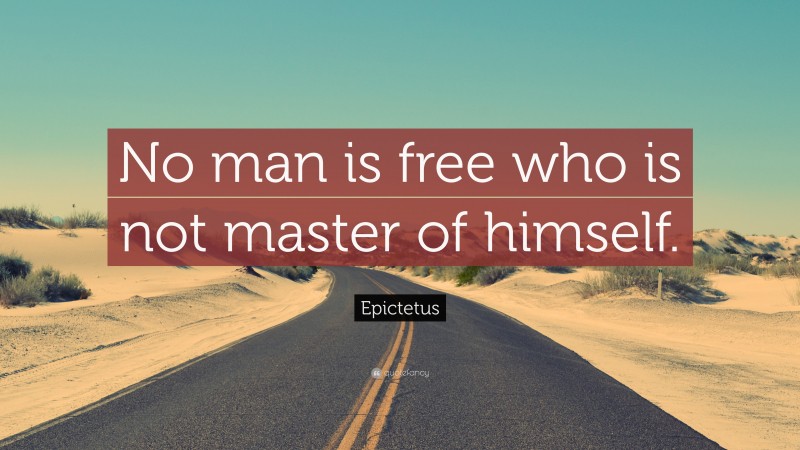No Man Is Free Who Is Not Master of Himself
In the tapestry of life, where threads of desires, emotions, and aspirations intertwine, true freedom eludes those who remain tethered to the chains of their own impulses. It is in the mastery over ourselves that we find the key to unlocking the elusive gate of personal liberation.
From the Stoic philosophers of ancient Greece to the existentialist thinkers of the 20th century, the idea of self-mastery has been a cornerstone of philosophical discourse. The Stoics believed that true happiness lay not in external circumstances but in the ability to control our own reactions to the world. The existentialists, on the other hand, emphasized the importance of personal responsibility and the need for individuals to create meaning and purpose in their own lives.
The Importance of Self-Mastery
Self-mastery is not a mere abstract concept; it is a skill that can be cultivated through practice and discipline. By gaining control over our thoughts, emotions, and actions, we empower ourselves to navigate the challenges of life with greater resilience and equanimity.
Self-mastery allows us to:
-
Resist temptations: When faced with alluring but harmful choices, we possess the willpower to make decisions that align with our long-term well-being.
-
Manage emotions: Instead of being overwhelmed by our emotions, we develop the ability to regulate them, preventing them from clouding our judgment or sabotaging our goals.
-
Control our actions: We have the power to choose how we respond to situations, empowering us to act with integrity and purpose, even in difficult circumstances.
-
Create meaning: Through self-mastery, we gain the clarity and self-awareness necessary to identify our passions and live a life in accordance with our values.
Tips for Developing Self-Mastery
Cultivating self-mastery is an ongoing journey. However, there are numerous strategies that can help us along the way:
-
Practice mindfulness: Paying attention to our thoughts, emotions, and actions without judgment helps us to become more aware of our inner workings and to identify areas where we need to improve.
-
Set clear goals: Defining our aspirations and breaking them down into smaller, achievable steps provides a roadmap for progress and helps us stay motivated.
-
Build a strong support system: Surrounding ourselves with positive and supportive individuals can help reinforce our efforts and provide encouragement when we encounter setbacks.
-
Learn from our mistakes: Failure is an inherent part of the learning process. Instead of dwelling on our shortcomings, we can use them as opportunities to reflect and grow.
-
Seek professional help when needed: If we struggle to develop self-mastery on our own, there are therapists and coaches who can provide guidance and support.
Frequently Asked Questions
What are some signs of a lack of self-mastery?
- Impulsivity
- Procrastination
- Difficulty managing anger
- Poor decision-making
- Feeling overwhelmed by stress
How can self-mastery benefit our relationships?
- Improved communication
- Greater empathy
- Reduced conflict
- Increased trust
- Stronger bonds
Is self-mastery a realistic goal for everyone?
Self-mastery is a lifelong pursuit. While it may not be possible to achieve perfection, we can all make progress and strive to become more in control of ourselves.
Conclusion
True freedom lies not in external circumstances but in the mastery of ourselves. Through self-discipline, we gain the power to overcome obstacles, resist temptations, and create a life that is consistent with our values and aspirations.
Are you interested in learning more about the topic of self-mastery? Share your thoughts and experiences in the comments below!

Source Image: www.learning-mind.com

Source Image: www.learning-mind.com

Source Image: www.learning-mind.com
Grateful for your discerning approach to understanding this. No Man Is Free Who Is Not Master Of Himself, provides insightful information to broaden your horizons.